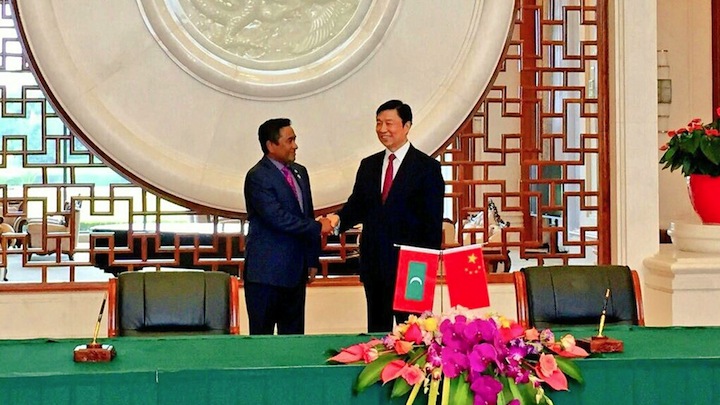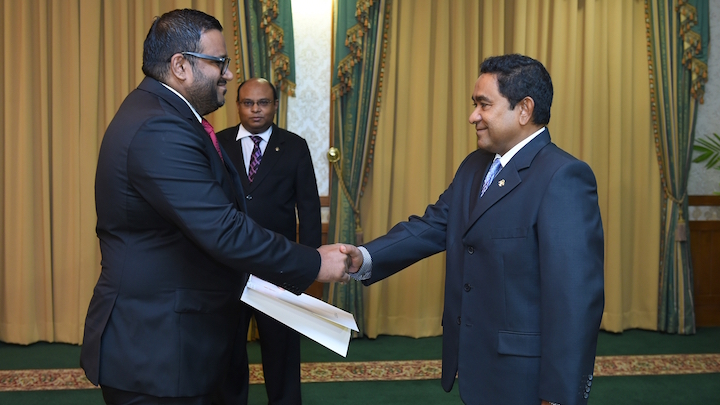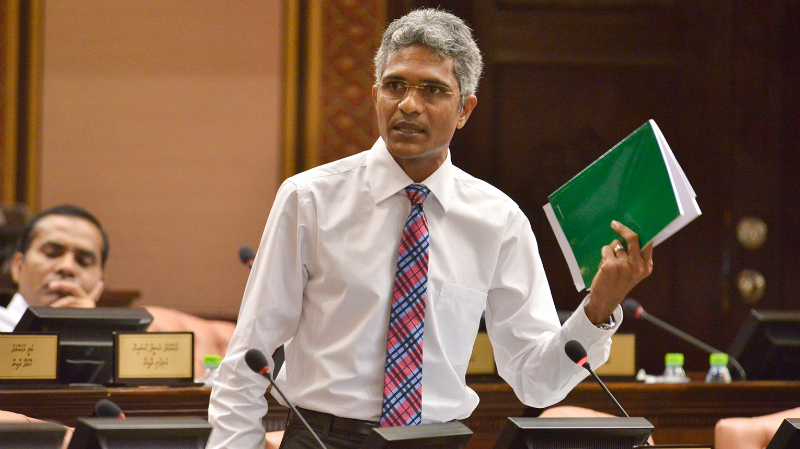The parliament has amended the constitution to authorise foreign ownership of land or freeholds in the Maldives with overwhelming support of 70 votes in favour, a day after the amendments were introduced to the People’s Majlis.
Ten MPs of the main opposition Maldivian Democratic Party (MDP) and nine MPs of the Jumhooree Party (JP) also voted in favour of the unprecedented changes. Some 14 MPs voted No.
MPs opposed to the move expressed concern over possible Chinese military expansion in the Maldives, and the lack of time to review the amendments. The bill was submitted on Monday, debated and sent to committee for review at an extraordinary sitting last night, and put to a vote today.
The opposition MPs’ backing was necessary as a three-quarters majority or 64 votes was required to amend the constitution. The ruling Progressive Party of the Maldives (PPM) and coalition partner Maldives Development Alliance (MDA) controls 48 seats in the 85-member house.
Shortly before the vote was called, former president Maumoon Abdul Gayoom, leader of the PPM and half-brother of President Abdulla Yameen, urged the president to seek public opinion before ratifying the amendments. This is the first time Gayoom has publicly opposed president Yameen’s actions.
The amendments will allow foreigners who invest more than US$1 billion to purchase land within the project site. At least 70 percent of the area when the project is completed must also be reclaimed land. The constitution previously prohibited foreign ownership of any part of Maldivian territory, but allowed leasing of land for up to 99 years.
New Cold War
Speaking during the final debate on the amendments today, MDP MP Eva Abdulla said that a Chinese Yuan class 335 submarine passed through Maldivian waters and docked at the Karachi port on May 22, adding that Indian media called it “China’s deadliest attack submarine.”
Maldivian foreign and domestic policies should be based on ensuring Indian Ocean regional security as “Maldives is not in the South China Sea,” she said.
The Maldives is “a front line state” in the new Cold War and should not be a catalyst for conflict, the MP for Galolhu North added.
The MDP as a “centre-right party” supports free market policies and the principle of private land ownership, but could not support “selling land for China to build military bases” in the Maldives.
Eva said the MDP could support foreign ownership of land in the Maldives under a more transparent government and independent judiciary.
PPM MP Ali Arif conceded that the Maldives as a small nation is always vulnerable to influence from powerful nations. He said the committee addressed the concerns over sovereignty during its review process and added a clause to the bill stating that the Maldivian state will exercise complete authority over the territory designated for projects.
He added that 80 or 90 percent of the Maldives’ 112 luxury resorts are operated by foreign businesses and multinational hotel chains have invested millions of dollars in the lucrative tourism industry.
Majority leader Ahmed Nihan, who had submitted the bill, meanwhile assured the public that the ruling party would not compromise Islam or Maldivian traditions and sovereignty. He stressed that the amendments only apply to newly reclaimed land and that the government was not planning to sell existing natural islands or reclaimed land.
No public debate
Adhaalath Party MP Anara Naeem said she had proposed amending the bill to allow lease of Maldivian territory for up to 150 years, but the parliament secretariat did not accept her amendment as it was submitted after 12pm.
Anara said a single day was too short a period to approve such changes to the constitution without consulting stakeholders or experts.
Gayoom raised the same issue in a letter sent to President Yameen and shared with the media by the former president’s office. He urged his brother to hold a public referendum on the issue, noting the amendments were proposed without public debate.
I have appealed to president to seek public opinion on proposed constitutional amendment re land ownership before ratification.
— Maumoon Abdul Gayoom (@maumoonagayoom) July 22, 2015
Gayoom also stated that previous governments did not sell any part of Maldivian territory to prevent foreign influence over the country’s independence, sovereignty, and resources.
MDP MP Ahmed ‘ADK’ Nashid also expressed concern with passing the amendments without a debate among the public or an assessment of the pros and cons of the proposed changes.
Despite the economic benefits of attracting foreign investors, Nashid warned that the amendments could pose dangers to Maldivian sovereignty with foreign powers encouraging secessionist movements in a situation similar to Crimea breaking away from the Ukraine.
MPs Eva, Nashid, and Anara were among those who cast dissenting votes along with MDP MPs Rozaina Adam, Mohamed Rasheed Hussain, Mohamed Falah, Mohamed Aslam, Mariya Ahmed Didi, Imthiyaz Fahmy, Ibrahim Mohamed Solih, and Fayyaz Ismail.
JP MPs Ali Hussain, Abdulla Riyaz, and Independent MP Ahmed Mahloof also voted against the proposed changes.
MDP MPs Abdul Bari Abdulla, Abdul Ghafoor Moosa, Abdulla Shahid, Ahmed Marzooq, Ali Azim, Ali Nizar, Ibrahim Shareef, Ibrahim Naseer, Mohamed Nazim, and Mohamed Abdul Kareem voted in favour of the bill along with nine JP MPs and Independent MP Hussain Areef.



